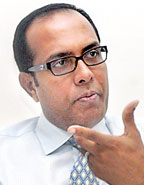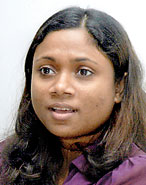Nightly protests on the streets of the Maldivian capital of Male for the past two weeks, has triggered an unprecedented crisis in the mostly tranquil nation, with the government fearing that extremist forces are attempting to topple it with a call to jihad, a charge denied by the Opposition.
The street protests began with the arrest of the Chief Justice of the Criminal Court of the Maldives, Abdulla Mohamed, and have grown increasingly violent each day, forcing the government to seek assistance from the UN, as well as from the Commonwealth, for a team of legal experts to visit the country to help resolve the impasse that has been created between the government and the judiciary, since Abdulla’s arrest.
 |
 |
| Maldivian Foreign Secretary Mohamed Naseer and Deputy Minister of Foreign Affairs Hawla Ahmed Didi. Pix by Saman Kariyawasam |
The government accuses Judge Abdulla of being in complicity with criminals. “The opposition has been inciting people using hate speech to mobilise activists on the ground, while the government upholds the freedom of speech as guaranteed under the present constitution. “The inflammatory speeches and incitement to violence is not something that the government can condone,” Maldivian Foreign Secretary Mohamed Naseer said.
He was in Colombo on a short visit, accompanied by the Deputy Minister of Foreign Affairs of the Maldives, Hawla Ahmed Didi, to brief the Government on the developing situation there.
The government accuses the Adhaalath Party of the Maldives, as well as the opposition Progressive Party of the Maldives (PPM), of being behind the unrest.
“They have called for jihad to topple the democratically elected government in the country. This is very worrying for the government, for it is high treason under the constitution,” Foreign secretary Naseer told the Sunday Times.
This charge was vehemently denied by Umar Naseer, the Vice President of the PPM, the main opposition party which has been in the forefront of the street protests.
He told the Sunday Times, via phone from Male, that the violence during the protests has been instigated by vigilantes unleashed by the government, many of whom are hardcore criminals released from prison under a special programme called ‘second chance.’
“This charge of jihad is nonsense. (President)Mohamed Nasheed is like (Muammar) Gaddafi who kept saying that al Qaeda is behind the attempts to overthrow him, when in reality, it was the people of the country who want him out,” Umar Naseer of the PPM said.
The PPM was founded by former President of the Maldives Maumoon Abdul Gayyoom, and has joined with other opposition forces to call for the immediate releases of Judge Abdulla Mohamed, as well as the resignation of President Nasheed. “(President) Nasheed should step down and hand over power to his deputy,” the PPM member said.
He also said that allegations leveled against the detained judge by the government are false. “He is an absolutely unbiased and educated judge. The President has acted in violation of the constitution, and wants to overrule the courts, but this is unacceptable,’ PPM’s Umar Naseer said.
The Maldivian Foreign Secretary, however, said that the government had no option but to detain the judge. “This particular judge was appointed by the former government of President Gayoom, and, as provided by the new constitution, all judges appointed by the former government could continue for two years.
“The Judicial Services Commission (JSC) is empowered to reappoint them after evaluating their performance, and hence, he was reappointed, but he has connections to thugs and opposition politicians, and has been releasing criminals onto the roads, including drug dealers, and they are causing much disturbance on the roads,” Deputy Minister Hawla Ahmed Didi said.
She added that, people who should be behind bars are on the streets. “To prevent the situation from worsening, the Home Minister ordered the judge to be taken into custody,” she explained.
The situation has led to an impasse between the government and the judiciary, and it is in the light of this that the government has sought intervention by the UN and the Commonwealth, to send a team of legal experts to resolve the crisis.
“We want a team of highly qualified retried judges to come to the Maldives and help to reform our judiciary. We are a democratically elected government, and are in a transitional phase, so we need to uphold democracy and human rights as well. There is consensus among the people that the judiciary needs to be reformed. Everything else has changed. There is a new constitution, a new government, but the judiciary is lagging behind,” the Foreign Secretary said.
The opposition too has welcomed the decision to seek assistance from the UN and Commonwealth. “We are very happy about this move, because consultations are needed. But all areas need to be reformed, not only the judiciary,” the PMM member said.
Both the government and the opposition say they have the backing of the people. “We are a small, peace-loving society. We want to maintain that. We don’t want any kind of insecurity for the people living there,” Deputy Minister Didi said,
The PPM member said that their protests against the actions of the government have the backing of the vast majority of the people. “At one of our rallies last week, there were 23,000 people, which shows the support we have. Our nightly protests draw a smaller crowd who are fearful of the growing instances of violence,” he added.
Opposition spreading misinformation in Sri Lanka: Maldivian Foreign Sec.
Maldivian Foreign Secretary Mohamed Naseer briefed his Sri Lankan counterpart on his country’s opposition groups using Sri Lankan soil to fan unrest in his country and was assured unspecified assistance to bring normalcy back to the archipelago.
He said thse groups were spreading what he called “misinformation” in Sri Lanka on the unfolding events.
The visiting Foreign Secretary Nasser who met with Foreign Secretary Karunatillake Amunugama, along with the Deputy Minister of Foreign Affairs Hawla Ahmed Didi, told the Sunday Times that, there are many opposition members who are quietly active in Sri Lanka and “could give a wrong image of what is happening in Male.”
Secretary Amunugama told the Sunday Times that, he had inquired during the meeting, if the Maldives required any assistance from Sri Lanka, and was told that, there was no such necessity at the moment. “He briefed me about the situation in Male, which they take very seriously. We have close cordial relations with the government, and we support the democratically elected government of that country,” Mr. Amunugama said.
Mr Naseer told the Sunday Times that, his Government was eager to brief the Government of Sri Lanka (GoSL) on the developing situation, as Sri Lanka is the closest neighbor and the friendliest. “We know that opposition forces are quite active here as well. We don’t want them to create a wrong impression of what is happening there,” he said.
He said that, he was assured of the full support of the GoSL. “I was told that if we want any assistance, Sri Lanka is ready to help in anyway. We are very happy about it,’ he said.
There is also growing worry that tourism, which is the country’s lifeline, will be affected, if the unrest persists and spreads beyond the capital Male. |



